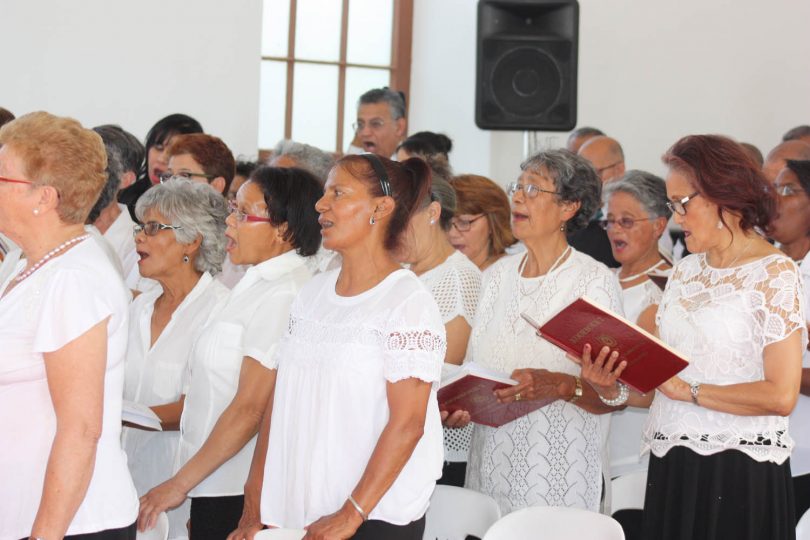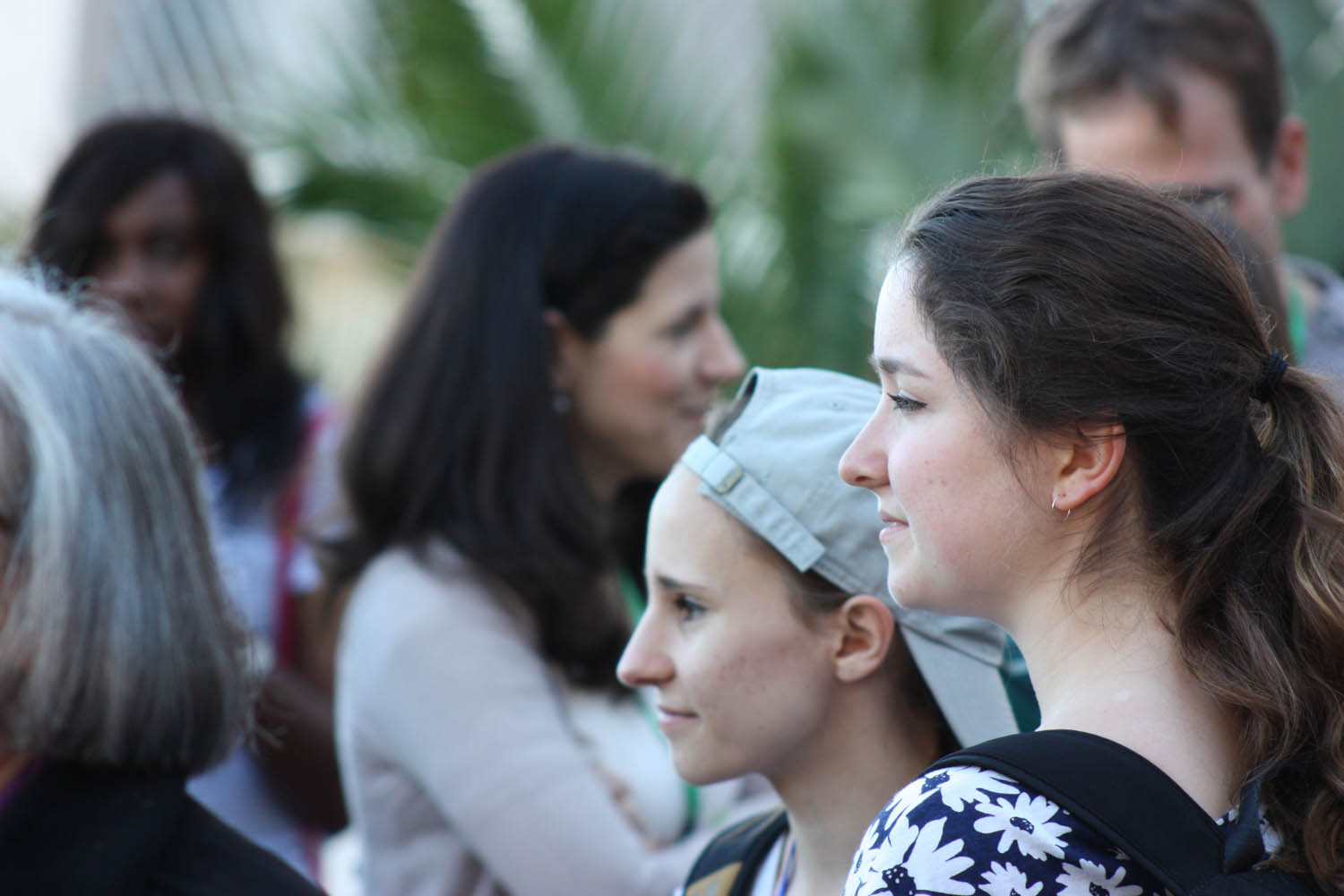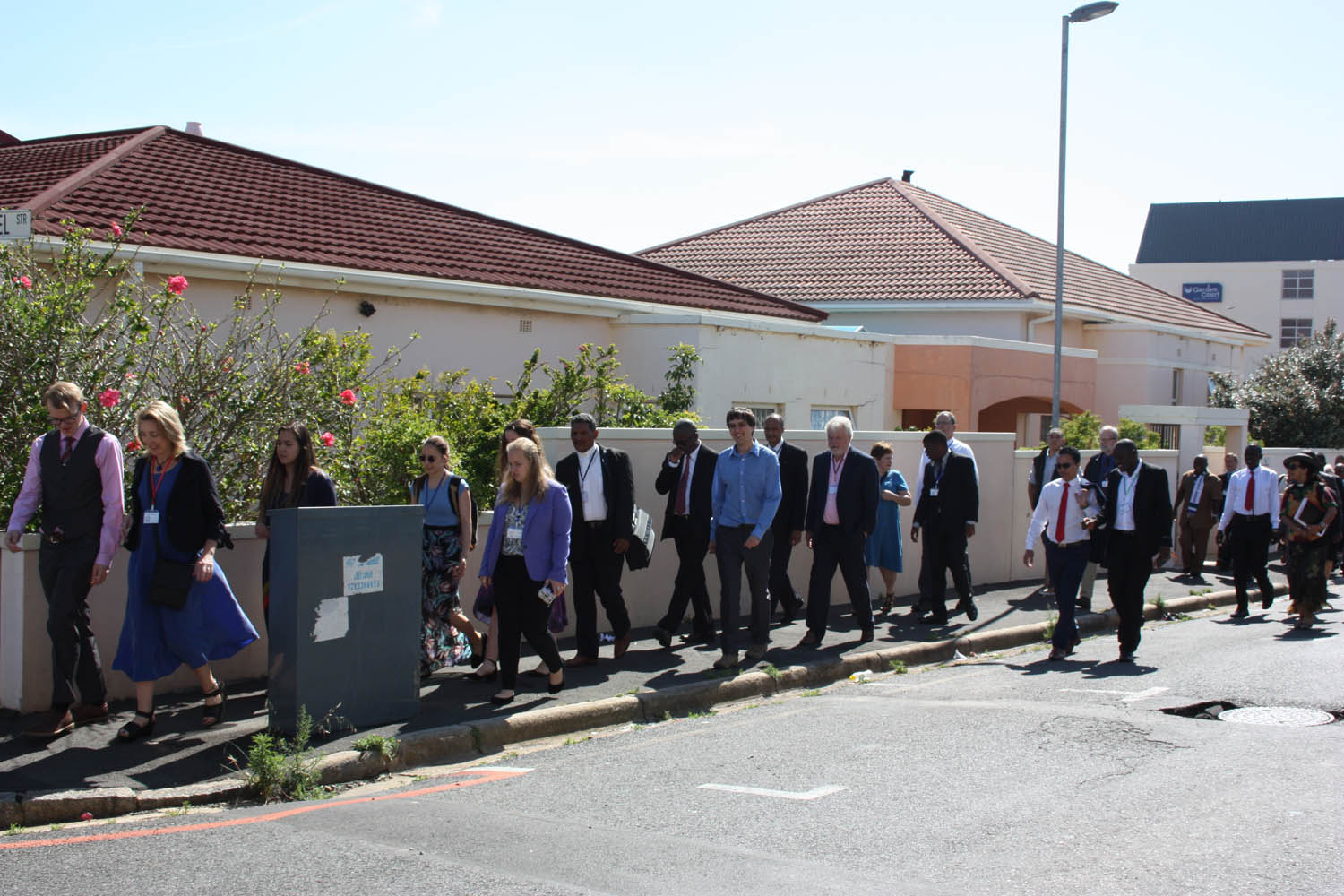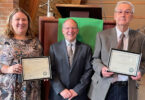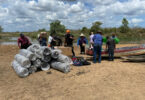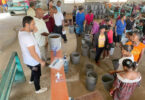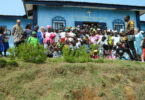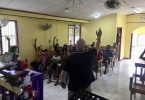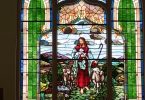Members of the North American delegation to the Unity Mission Conference held in South Africa last November share their insights on being part of this historic occasion.
We must always be students
The challenge of coming together as a worldwide unity is that we come from our own context, each from our own culture, speaking our own language, and carrying our own history. With this challenge in mind, one of the questions we asked is, “How, as a unity, can we answer our call to mission despite such varied perspectives?”
In small groups of about 20, we examined this question by sharing the ways that mission both thrives and fails within our own contexts. For example, in Malawi, there is a Moravian church that is located near refugee camps, with refugees coming from countries as far away as Burundi, Somalia and Rwanda. The church went to the people in these camps and asked, “What are your needs?” They found an overwhelming urgency for a school for the children, and so, the church joined together with a partner organization to build a kindergarten. Though run in part by the church, this school is not necessarily a Christian school and does not discriminate based on religious creeds. Rather, the people who built it, and the people who teach there, demonstrate the love of Jesus everyday to a diverse group of people that have faced many hardships.
The Moravian Church has found that eventually the people from the refugee communities will ask them, “Why? Why did you do this?” The Malawi church members will then respond by speaking of Christ’s love for them.
From stories like this, we took away a number of things. For example, there is the necessity to listen and address the needs of people based on their context; not to think we know what they need based on our own context. We must always be students, for no matter where we go or how long we are there, it is important to always listen and learn in an open and loving way. Additionally, from stories such as this one, the delegates in my group learned the importance of continuing to network with one another in order to exchange news and share our successes and resources. Across the unity, the results we yield and the lessons we learn can oftentimes be just as useful from Malawi to Minnesota to Nicaragua.
Luckily, it is easier than ever before to traverse oceans and time zones with today’s technology. In a more globalized world, we have the great advantage of using our different angles and ideas to bring us together through this exchange of information.
I learned that in order to be a Unity, it is not imperative that we believe a single, universal truth. What makes us a Unity is our willingness to pray for one another, to learn from one another and to love one another in Christ. This sentiment is something that I felt very deeply and fully as I participated in shaking hands, singing songs and praising God, one in the spirit with Moravians from 37 countries around the world.
Holland Griffin was a Youth Delegate from the Northern Province and is a member of Waconia Moravian Church, in Waconia, Minn.
Reinforcing idea of Moravian mission
My experience at the Unity Mission Conference was truly a blessing. It was wonderful to physically see and hug people that I don’t normally see because of the geographic distances and it was awesome to meet new brothers and sisters from the Unity.
There were two things that caught my attention during the conference. One was that we have Moravians in India, who shared their story with us. They work in an area where Christianity is not well-received and they literally risk their lives for the sake of Christ. It was great to meet them and learn more about what they are doing in India.
Another thing that got my attention was the great number on youth representatives present at the conference. It was wonderful to see our Unity youth in action and interacting with each other and with the different conference topics. It is said that the youth is the future of the church, but I got to see that we have a great present with them involved now!
My role as part of the Unity Youth Committee was to be part of a panel entitled “Youth in Mission.” We had two sessions in which we had a very diverse group of people (the first was with youth, the second with older brothers and sisters) asking and wondering about the youth in their church and community. The panel was represented by different parts of the world including Jamaica, the Czech Republic, South Africa, North America and Peru.
It was a great overall experience with very educational lectures/essays, great panels and devotionals. However, I believe my favorite part in international conferences like this is always the time spent getting to know people. For me, those times were during meals, which provided a good fellowship environment and the opportunity to share and learn from each other.
My experience at the Unity Mission Conference has reinforced my concept of Moravian missions. We do it out of love for our neighbor and guided by the Holy Spirit. There is so much need out there, and when I say “out there” I mean right outside of our churches’ walls. It could be in our neighborhood or it could be on another continent. God is calling us to be his witnesses of love and reconciliation. We as Christians have the Great Commission to obey and as Moravians, we have a great mission heritage to continue.
The Rev. Angelica Regalado Cieza serves with the Southern Province Provincial Elders’ Conference in developing ministries in Forsyth County, N.C.
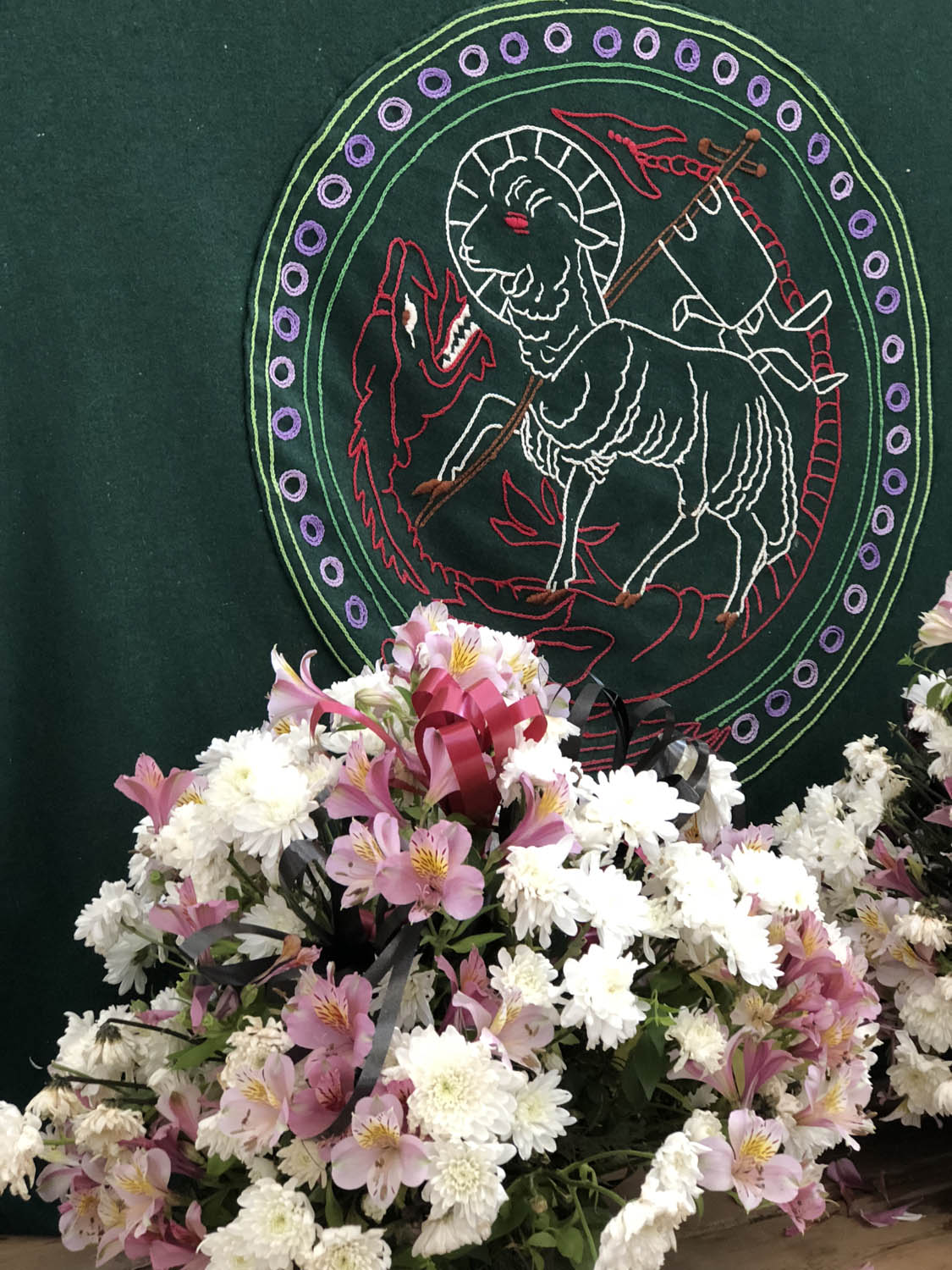
Displaying a diverse face
The 2017 Unity Moravian Missions Conference displayed the diverse face of the worldwide Moravian Church. We were told that the group of 200 or so participants included representatives from 35 different nations and many different languages. The different faces, the different cultures—it was an amazing thing to witness first-hand. Yet, for all the diversity in the Moravian church, what ultimately impacted me the most was not so much our differences, but what we have in common.
Throughout the conference—during breaks, over meals, and at other times—when I met someone new, I would often pose to them this question: “When people in your country ask you what it means to be a Moravian Christian, what do you tell them?” I asked a wide variety of Moravians, from all different parts of the world, yet the answers I received echoed the same themes over and over. I thought that the response from one of the brothers from Burundi captured this especially well : “What does it mean to our people to be Moravian? First, ‘brother and sister.’ We are as brothers and sisters to one another,loving each other, equals. Second, ‘Christ as Chief Elder.’ We believe in the Trinity, but Jesus is our church’s leader. And we are to obey him in everything. Third, ‘Mission.’ We bring Jesus to the people, especially people others have neglected. And fourth, ‘action.’ We believe ‘In essentials unity, in non-essentials liberty, in all things love.’ And it is the love that is most important; love not as words, but love as action.”
Although the faces within our Unity may be quite diverse, the deep convictions we share unite us in a powerful way. I’m deeply grateful to have been given the opportunity to experience this first-hand at the 2017 Unity Missions Conference.
The Rev. David Geyer is pastor of College Hill Moravian Church in Bethlehem, Pa. and serves on the Board of World Mission.
Part of a worldwide Unity
It won’t surprise many who know me to hear that the singing was a deeply moving experience for me,at the Unity Mission Conference. We got to sing Jesus Makes My Heart Rejoice in English, German, Dutch, Afrikaans, French, Spanish, and Miskitu… to hear songs in many languages…and to hear and see the joy of the conference participants as we sang together…and to note the omissions in the languages for many hymns. (For instance, we have Christian Hearts in Love United in eleven languages – and Spanish is not one of them!)
An idea emerged from somewhere during the conference, an idea which sparked enthusiasm whenever it was mentioned. What if we were able to create a Unity Hymnbook? What if we were able to gather three or four songs from every area of the Unity, maybe even every country, and then have those songs or hymns translated into as many languages of the Unity as we could? We might find ourselves with a collection of 50 or more songs, each in two dozen languages!
It sounds like fun, and it doesn’t sound all that hard … except that it requires two big steps: First, getting song submissions. Many of these might be audio-only and need transcription so that others could learn them. (Or our book might include an audio recording!) And for most, we will need multiple translators, able to interpret the original language and put it into words in a different language, words that (hopefully) express the same meaning and can be sung to the same music.
For me, then, the Unity Mission Conference was an occasion that strengthened my awareness of being part of a worldwide Unity, a Unity whose very existence is a witness to Christ, and I saw the way in which music could continue to strengthen, and to express, our unity as brothers and sisters.
The Rev. Dr. Nola Knouse is director of the Moravian Music Foundation in Winston-Salem, N.C.
The view from the keyboard
As staff accompanist for the Unity Mission Conference, I had a unique perspective. From the buzz of the translators on my left (at least three languages were being translated at all times – Spanish, Swahili, and Miskitu) – to the uplifting and heart-wrenching reports from some of our provinces on my right, it was a joy to see the Moravian Unity at work and in fellowship together.
The singing was, of course, tremendous! From the unwavering solo voice of our Labrador Sister to the combined voices of the assembly singing our faith simultaneously in six languages (a very Moravian thing to do!) to the contagious joy of our Tanzanian brothers and sisters as they led a conga line of Siyahamba through the general assembly, the singing was an encompassing experience.
Most memorable for me, however, was the view I had from the keyboard. Before me were the faces of the Unity – at work, in play and in fellowship together – tangible evidence that we are indeed “One in Faith and One in Love.” It is something I will never forget!
Gwyn Michel is assistant director of the Moravian Music Foundation in Bethlehem, Pa.
A rich collaborative experience
I attended the Unity Mission Conference as an extension of my work on the Unity Committee on Theology. I was invited along with Rita Harry from the Netherlands/Suriname, Rev. Hesdie Zamuel from Suriname, and Bishop Sithembiso Ngqakayi from South Africa to offer a workshop on Contextual Theology, a topic which had been discussed at our 2017 UCOT meeting in Parimaribo, Suriname, in February. My travel and costs for the conference were supported by the local congregation (Waconia Moravian) which I am privileged to serve. Waconia also supported our Northern Province delegate Holland Griffin, a member of our church.
The workshop and the conference as a whole provided a rich collaborative experience, one for which I am extremely grateful. At the conference I was struck by three things: the cultural diversity of our global membership, the youth and energy of our delegates and the shared academic wisdom of our global leaders. My greatest takeaway from the conference are the copies of the lectures that were shared as part of our time together. I am working through these lectures with the Adult Sunday School class in our church. We are finding what is ours to do as one agent of God’s mission. We are sensing that the global Moravian church is called to be a witness to unity amidst diversity. We are trying to practice this locally as well as explore how we can support God’s mission for the Moravian church globally.
We enjoyed a day of worship and music at Moravian Hill Chapel in the heart of District Six in Cape Town. Many of us chose to walk to the church; curious folks came out of their homes to watch the parade of Moravians make their way to worship. On our day for excursions, a busload of us went to visit the Moravian settlement of Mamre. We were joined by Brother Christoph Reichel who had served at Mamre during the time of apartheid. He was remembered by many townspeople and he shared with us stories of his time there dealing with the white police force. Finally, a bit of fun was had courtesy of Justin Rabbach, the in-coming executive director of the Board of World Missions, who arranged for a ride in a speedboat at the harbor in Cape Town.
All in all, I am humbly grateful for the experience and it greatly enhanced the work that will continue in the Unity Committee on Theology.
The Rev. Dr. Amy Gohdes-Luhman is pastor of Waconia Moravian Church in Waconia, Minn.

Moravians from Albania to Zambia
On returning home after our Unity Mission Conference, I was asked by a non-Moravian friend, “Did you see anyone you knew?” I was so surprised by the question I could hardly answer! Of course I knew Moravian sisters and brothers from A to Z —Albania to Zambia! I was also reunited with dear friends from Barbados, Cuba, Denmark, Sierra Leone, Tanzania, and many other of the 35 countries represented.
One delightful new friend is our brother from Angola, one of our newest Moravian mission areas. His English was limited and my Portuguese is non-existent but our Moravian bond is already strong.
Seeing and hearing from many outstanding young Moravians from around the Unity was a special joy and encouragement to me, as probably the oldest Moravian attending at age 83! The lectures and workshops were excellent, but the best part of the conference for me was the informal times when we shared with each other and were inspired by the faith in action of 200 Moravians. Yes, I believe the Moravian Church worldwide is alive and well! Jesus, still lead on!
Sallie Greenfield, is a member of Kernersville Moravian Church in Kernersville, N.C.
Conversations with old friends and new
For months I eagerly anticipated being part of this Unity gathering in South Africa, mainly for two reasons. First, I knew I would once again see friends that I had made over the years while traveling to other provinces. Second, the focus of the conference was missions, which is definitely close to my heart. As it turned out, the six days that I shared with Moravians from 35 different countries felt like a continuously wonderful trip around the world (thankfully minus dozens of plane flights).
Conversations with old and new friends were the highlights of the conference for me, as we talked about our lives, our churches, and our mission efforts across the globe. Enjoying each other and learning from each other was a natural, because our Moravian bond connects us as brothers and sisters. Of the special opportunities included in our days together, two particularly stand out in my memory, things I’d never experienced before.
First came the excursion to historic Genadendal, the oldest Moravian mission village in Africa. Though I know lots about the beginning of our church in Bethlehem and then North Carolina, I had never heard the story of Georg Schmidt in South Africa. This German missionary traveled there in 1737 to evangelize the Khhoi people. During his seven years in this village, he baptized a woman named Lena who then learned to read the Bible at the mission school. When Schmidt had to abruptly return to Germany, Lena gathered the group of believers for regular meetings of prayer and Bible study. Almost 50 years later, new Moravian missionaries arrived in Genadendal, and there amazingly they found Lena still leading the flock.
The other highlight for me was the Sunday afternoon musical program at Moravian Hill Church in Cape Town. Besides an outstanding choir and band composed of Cape Town Moravians, there were individual vocal and instrumental selections from other local Moravians. Plus, specially selected songs were sung by conference attendees, including groups from Tanzania, Honduras and Nicaragua, Labrador and Alaska, Cuba, and the Northern and Southern Provinces. It was truly an uplifting two hours of Moravians from around the world using their musical gifts in praise to God.
Donna Hurt is a member of Home Moravian Church and a frequent visitor to Sierra Leone.
Connections and relationships
When Moravians talk about being a relational church, it is easy to gloss that over as simply knowing lots of other Moravians. The gift of those relationships was evident at the Unity Mission Conference as over 200 Moravians from 35 countries gathered to learn from papers and workshops, but more importantly, to learn from one another. I now have more connections around the Unity, which can only enrich our common witness.
On our excursion day, I chose to go to Mamre, one of the old settlement congregations. While touring the graveyard, two members of our group, Peter Vogt and Raimond Hersch, found the graves of their grandparents, who had been German missionaries to Mamre. I was humbled by the thought of those faithful souls giving their lives to share the gospel with people so far away. It reminded me of the great cloud of witnesses on whose shoulders we stand today.
While at Mamre, Br. Christoph Reichl told stories of his own missionary work there. He shared accounts of his decision to join with the congregation to speak against Apartheid, and the price they paid for their witness. His courage made me wonder how I am bearing witness today in the face of injustice and racism.
On Sunday, we all went to worship at Moravian Hill, a congregation in the middle of District Six. For decades this congregation had been a faithful witness and had educated the children of the area, including many Muslims. During apartheid, this area of Cape Town was declared a white area. All non-whites, Christians and Muslims alike, were forcibly relocated to settlements outside the city. The Moravian Church was taken over by the government and turned into a gymnasium for a Technical College. As apartheid was dismantled, Muslims remembered that the Moravians had educated and cared for them, so they joined the Moravians in petitioning the government to return the building to the Moravian Church.
When I was in Cape Town in 2007, the inside of the sanctuary was still a shambles. It was a powerful moment to return, ten years later, to worship inside this church, which stands as a beacon of hope and witness to all. The tour guide at the District Six Museum said, “We don’t consider Moravians tourists; you are travelers—because you walked with us through apartheid and still walk with us today.”
The Rev. Dr. Betsy Miller is president Northern Province Provincial Elders’ Conference.


